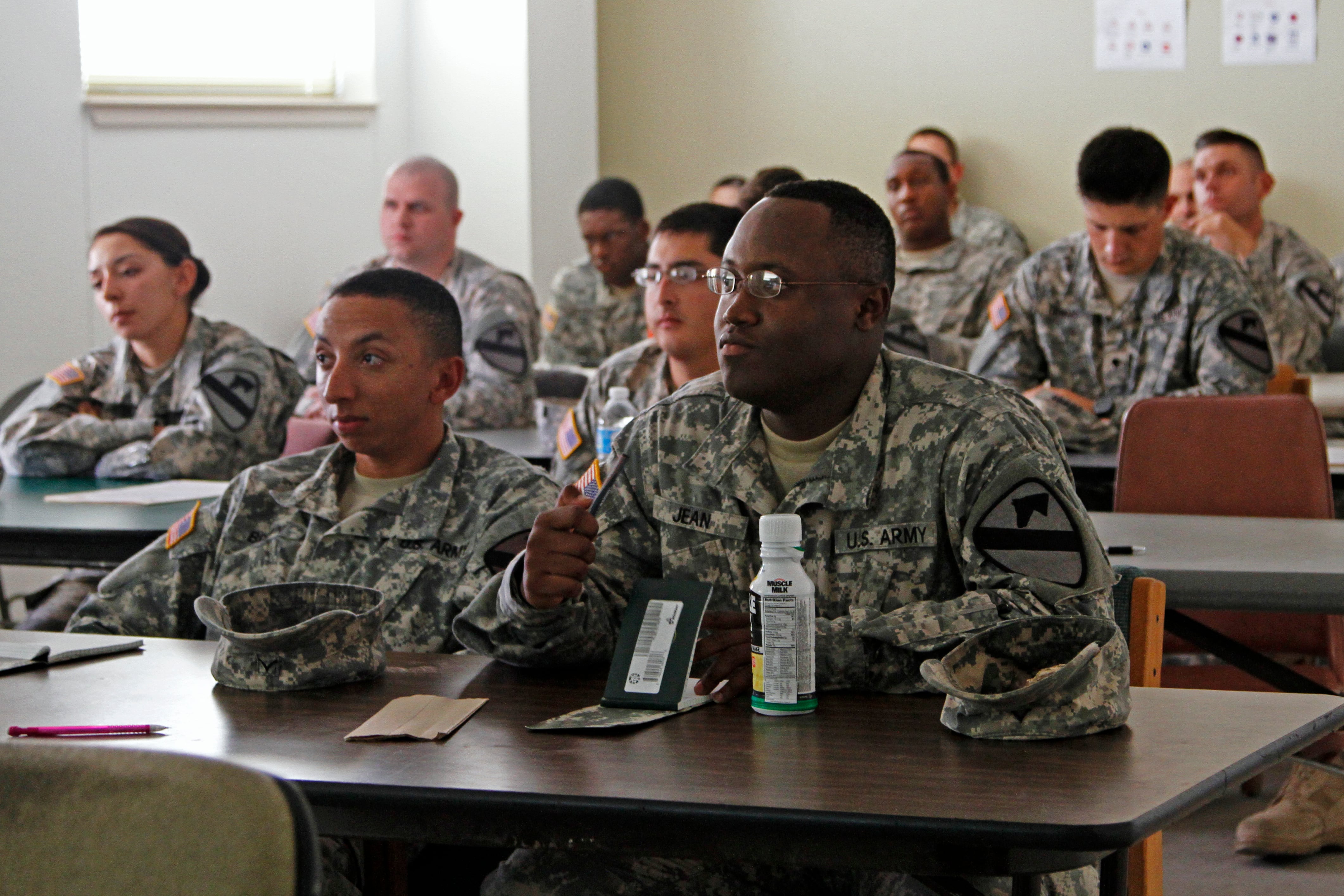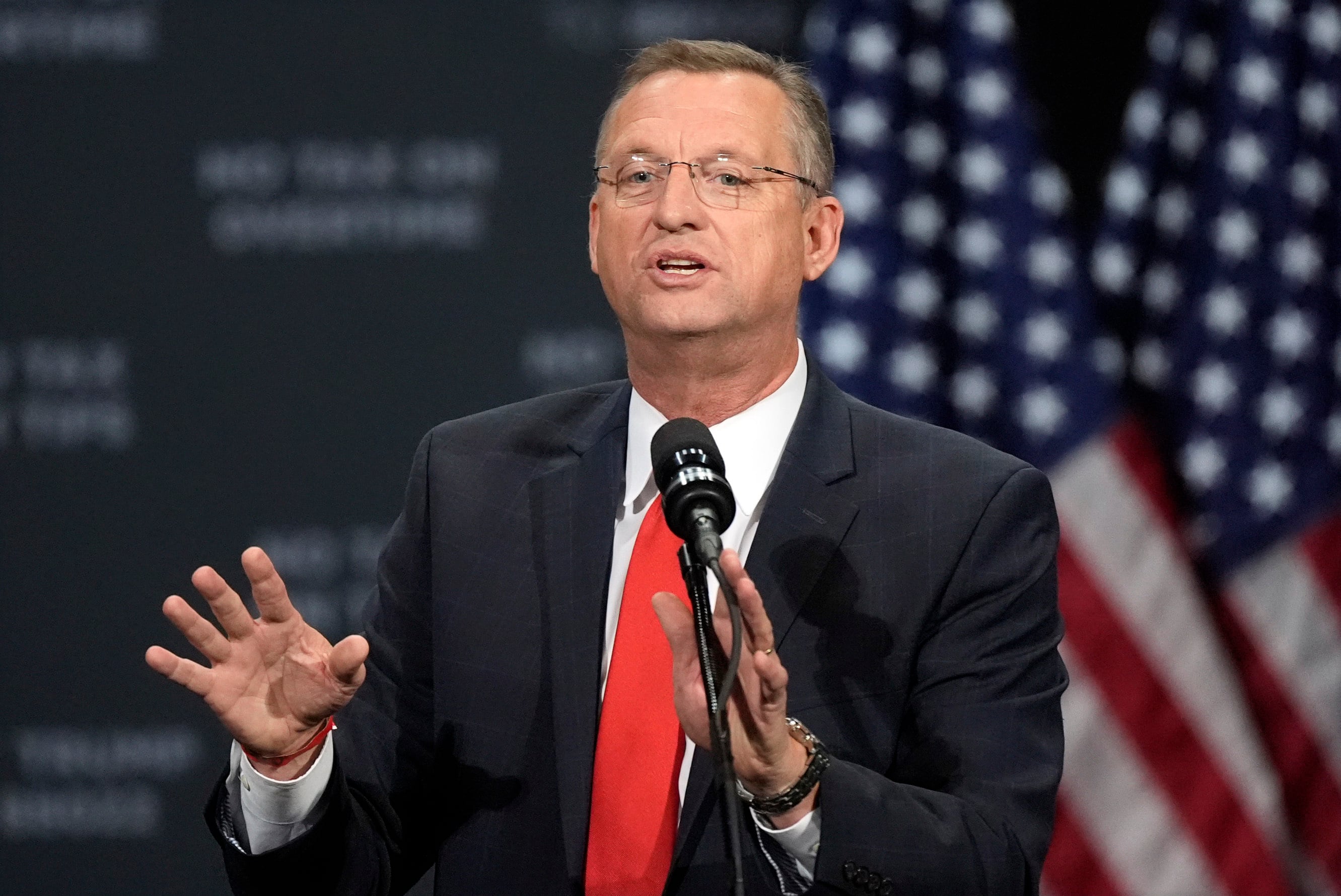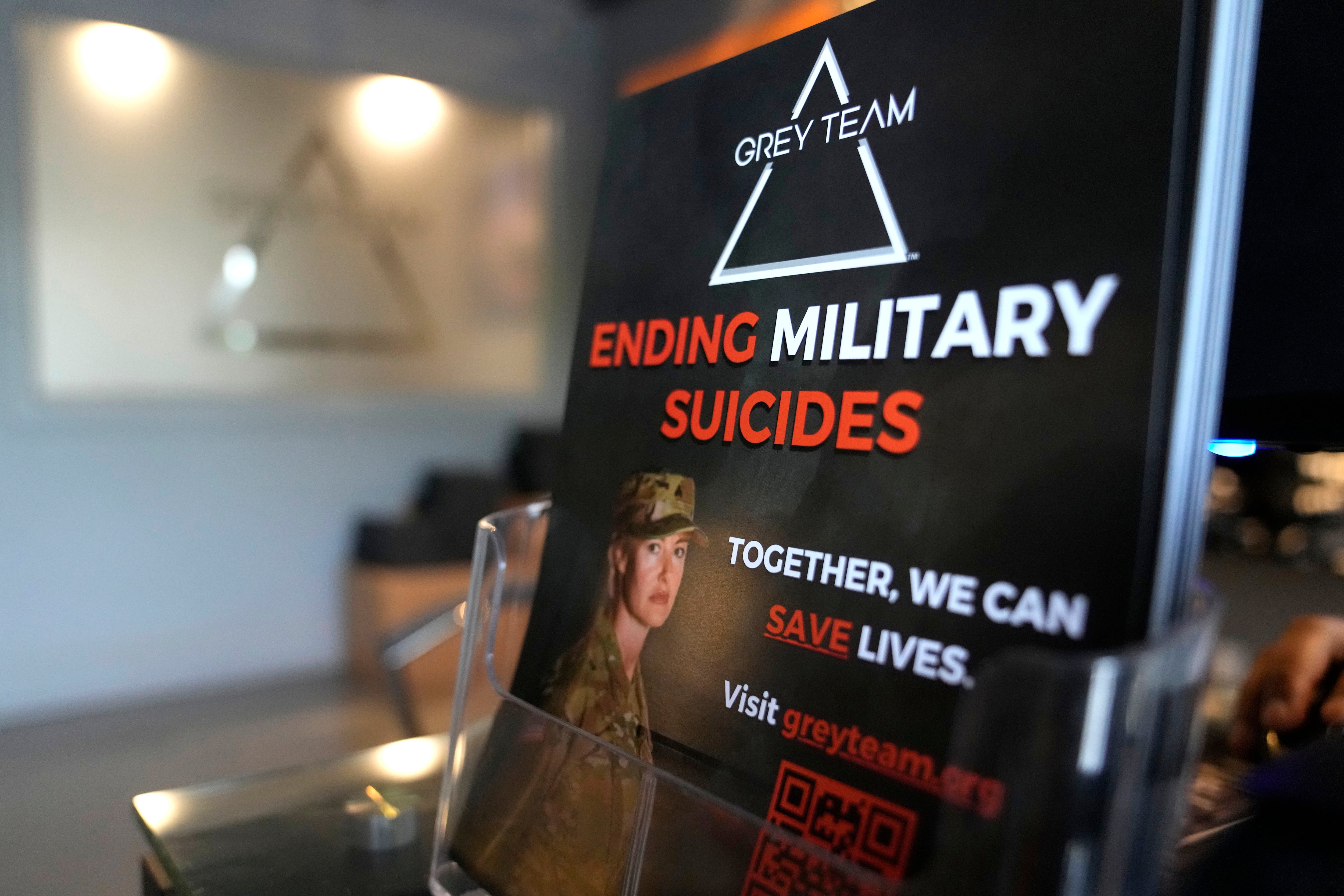The Army is overhauling its PME, making classes tougher and more performance-based. Coming soon, soldiers will be graded on their work and maintain a grade-point average in their record. Soldiers will also be ranked by class — good news if you're smart, bad news if you struggle with your studies.
The Army is also looking to include a writing assessment before every professional military education course.
These changes are just the beginning for an Army focused on growing and developing better leaders, said Command Sgt. Maj. David Davenport, the senior enlisted soldier for Training and Doctrine Command.
"Education is highly important to me," he said. "This is all leading to building that noncommissioned officer that's adaptable, can fight and win in a complex world. I'm excited about it."
These new initiatives come on the heels of a new strategy called STEP, or "select, train, educate and promote," that became official in August.
Under STEP, soldiers must have the right level of education before they can be promoted to the next rank. It goes into effect Jan. 1 for soldiers seeking promotion to sergeant and staff sergeant. It becomes mandatory for promotion to sergeant first class later in 2016 and for promotion to master sergeant in 2017.
The new promotion requirements expand on the select, train, educate and promote procedures already used for advancements to sergeant major.
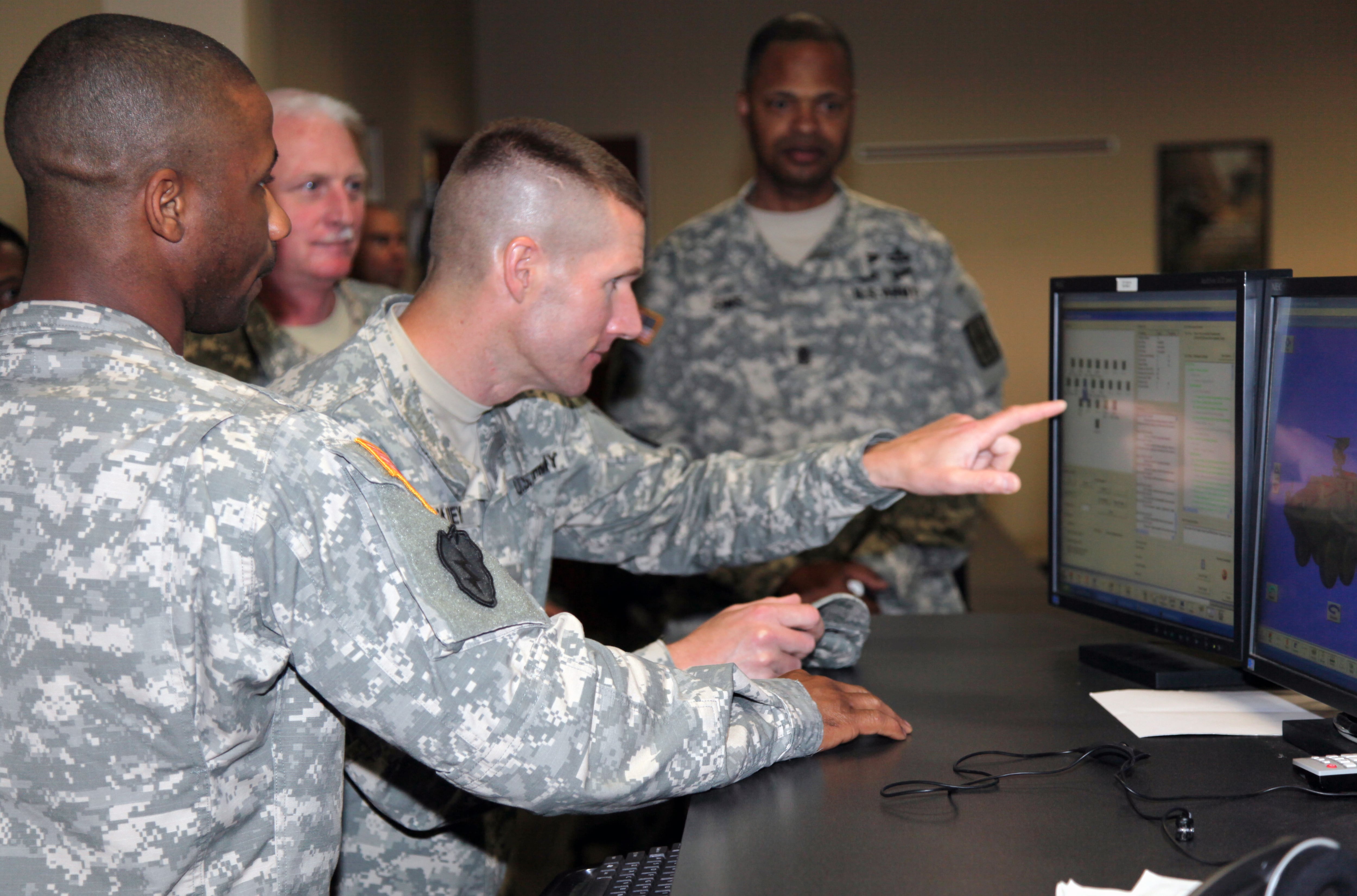
Sergeant Major of the Army Dan Dailey, center, has made improving education a top Army priority.
Photo Credit: Keith Desbois/Army
"We want to make sure that [the soldiers] leading the men and women of our nation are fully trained, and that they have the proper education and experience to handle whatever mission or complexities they may face," Sergeant Major of the Army Dan Dailey said when STEP was rolled out in August.
Here is a closer look at what the Army is doing.
Writing assessment
This spring, the Army ran a pilot English comprehension and writing assessment with about 500 soldiers attending the Warrior Leader Course. The course primarily targets specialists seeking promotion to sergeant.
The pilot ran from March through May at Fort Bragg, North Carolina, Fort Hood, Texas, Camp Williams, Utah, and Parks Reserve Forces Training Area, California.
On the first day of class, students were asked to write an essay. In this case, soldiers were given 50 minutes to write an essay about peer pressure, said Mary Miller, an instructional systems specialist at TRADOC's Institute of NCO Professional Development.
Because of the population being assessed, the essays were graded at a college freshman level, she said.
The assessment used the Educational Testing Service's Criterion Online Writing Evaluation Service, an established program that automatically scores essays based on the complexity of the writing, grammar, spelling and other facets, said Liston Bailey, chief of learning initiatives and innovations for INCOPD.
"The findings were that a significant portion of the sample could do better with their writing," Bailey said. "We found some deficiencies, we found there were opportunities to improve their performance in terms of written communication."

The Army believes writing skills go hand in hand with leadership skills.
Photo Credit: Spc. Phoebe Malkowicz/Army
In fiscal 2016, which starts Oct. 1, the Army will expand the pilot to all soldiers attending the Basic Leader Course (the new name for the Warrior Leader Course), Bailey said. That's about 45,000 soldiers, he said.
The writing assessment gives Army leaders an idea of how well soldiers can express themselves in writing.
"We believe it's important noncommissioned officers can speak with authority and write with authority," Bailey said.
Eventual plans call for the Army to assess soldiers at each level of PME, including all the way up to the Sergeants Major Academy. The degree of difficulty for the assessments also will increase with each level.
Ideally, soldiers attending the Advanced Leader Course should be writing at the college upperclassman level, while those in the Senior Leader Course should be producing early graduate school-level work, Miller said.
"We know that individuals who can write well think critically," Miller said. "This is where all of this is headed."
It's important to note that INCOPD is "not trying to make NCOs like officers, and we're not trying compare NCOs to kids going to college," Bailey said.
"What we're saying is their writing skills should progress over time to where they're comparable to someone who has a college-level education," he said.
Davenport said he plans to implement the writing assessment at the Drill Sergeant Academy as well.
"We've got to get away from bullet writing," he said. "We want noncommissioned officers who can communicate orally and in writing."
The long-term goal is to track a soldier's progress as he moves through the various levels of Army education, Davenport said.
"Are they developing in that self-development domain? Are they using their tuition assistance to take English 101 or participating in other online resources?" he said. "We have to educate, especially our noncommissioned officers, that there's a right way to express yourself."
Honing soldiers' writing abilities also will help them when they transition into the civilian world, Davenport said.
During the pilot earlier this year, soldiers were surprised to learn they would be given a writing assessment.
"At first they couldn't believe they were being asked to be assessed in this manner," Bailey said, adding that leaders plan to make sure soldiers are aware of the assessment so they can prepare for it.
Experts at INCOPD also are looking at training plans that can help soldiers improve their writing skills, Bailey said.
"If the feedback is they don't write very well, that tells the instructor, and now they can have that knowledge and devote their attention to make sure they're working with that student," he said.
There also are plans to include writing assignments in NCO education courses, such as note-taking activities, "to help reinforce writing," Bailey said.
GPA for all
The Army is developing a way to grade its courses, partly to make it easier for military education to translate into civilian college credits.
"One of the things we're learning from our academic partners is if you want to get equivalent credit, we've got to train and educate at the same equivalent level," Dailey said.
This includes moving away from multiple choice testing and incorporating more writing assessments, he said.
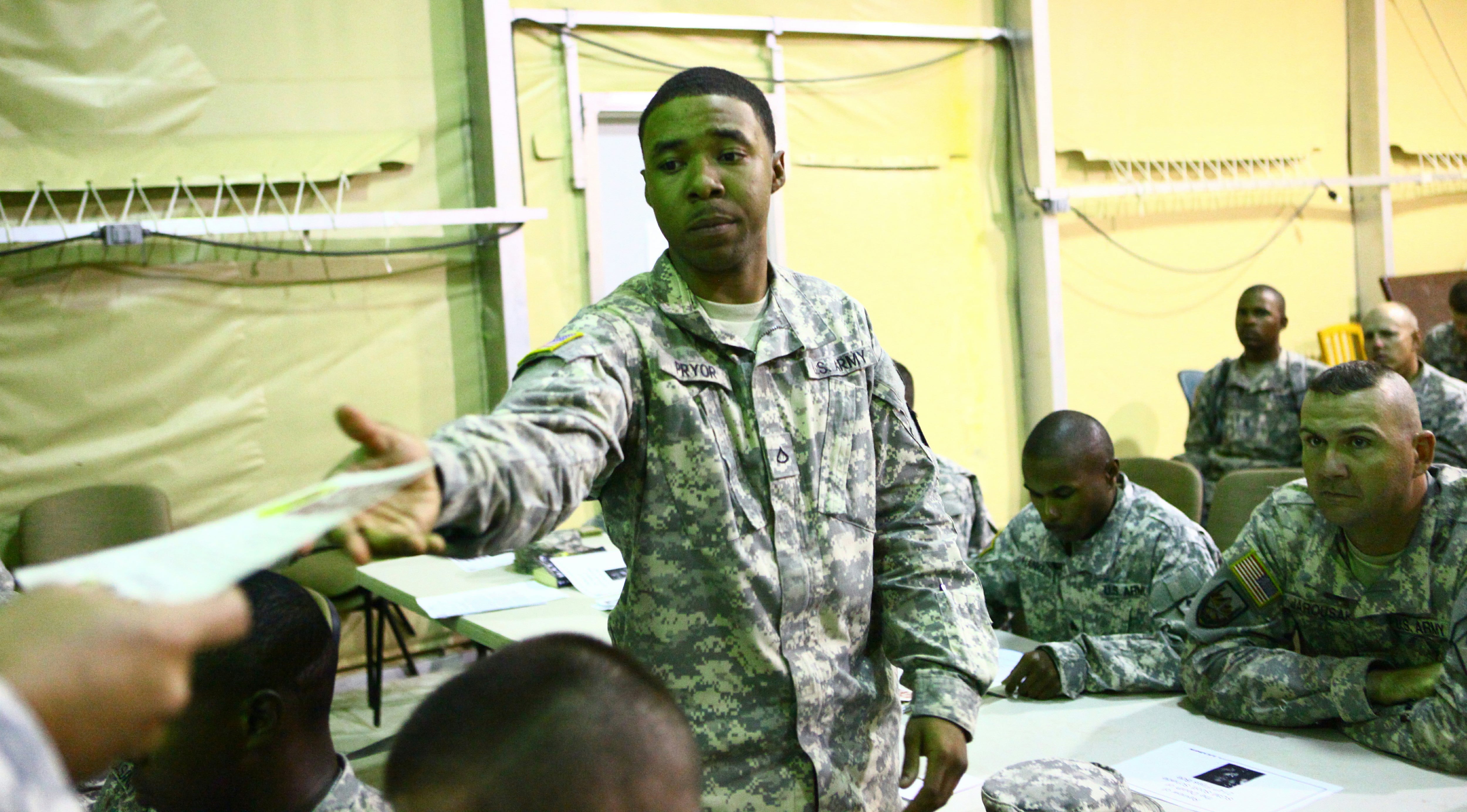
Soldiers enrolled in PME will have a grade point average, or GPA, included in their records. The Army is still developing a common standard for grades.
Photo Credit: Army
Developing a GPA will "clearly articulate your academic standing," Dailey said.
"We talk about the whole-soldier concept, we talk about evaluating soldiers, we're doing this with the new NCOER," he said. "If we say we're going to put a lot of time and value in education, we should be categorizing how well you did."
In its current form, Army Form 1059, the Service School Academic Evaluation Report, consists of a series of block checks to determine if a student met or exceeded the standards required for any particular course, Davenport said.
"We're going to begin to put GPAs on the 1059s," he said.
A self-described "academic geek," Davenport said TRADOC is still developing how soldiers will be graded and a common standard.
The goal is to be able to start assigning GPAs in fiscal 2018, Davenport said.
The Army also is looking at listing a soldier's class ranking on the 1059 - this means every soldier will be ranked against his or her classmates based on how they perform in a particular class or course.
"In a class of 1,000, someone's going to graduate No. 1, somebody's going to graduate No. 1,000," Dailey said. "Consistent with what we do, we should be able to clearly articulate that on our report cards."
New course for master sergeants
The Army continues to make progress with the new Master Leader Course, a new level of PME designed to bridge the "educational gap" between the Senior Leader Course and the Sergeants Major Academy, Davenport said.
TRADOC will run a pilot in October at the NCO Academy at Fort Bliss, Texas.
Thirty-two students — sergeants first class from all three components — will be selected to attend. The students will be run through the program of instruction. TRADOC will then seek feedback from the students to determine what worked, what didn't, what should be included, what was missed, Davenport said.
There are two versions of the course — a 22-day course or a 15-day course designed to fit within a National Guard or Army Reserve unit's two-week annual training, Davenport said. The pilot will feature the 22-day version, he said.
Using the lessons learned from the pilot in October, the Army will run three validation courses after Jan. 1, Davenport said. There will be a course on a Forces Command installation, one at a National Guard post, and one at an Army Reserve Training Institution.
The goal is to have the Master Leader Course up and running by fiscal 2018 — this means it will be a requirement for promotion to master sergeant for soldiers selected by the fiscal 2017 selection board.
Stricter rules for school deferments
To further emphasize the importance of education (and to avoid wasting a training seat) the Army is reinforcing and tightening its deferment policy for soldiers slated for school.
Currently, commanders can submit a memo to defer their soldier's school attendance to accommodate a deployment or personal emergency.
"What happens is if that doesn't come in a timely manner, we could lose someone sitting in that seat that we've paid for," Davenport said. "And over time, that authority has worked its way down the chain of command."
Army regulation calls for the first general officer in a soldier's chain of command to seek an operational deferment. The first lieutenant colonel in the chain of command can request a deferment for compassionate reasons, Davenport said.
Recent changes now require a general officer in both cases — operational or compassionate deferments. All requests are then forwarded to Human Resources Command for approval.
A second operational deferment request for the same soldier in the same level of PME must be signed by the next higher level general officer in that soldier's chain of command.
HRC will then produce a quarterly report on NCO education deferments that will be provided to the TRADOC command sergeant major.
"The problem is the backlog of soldiers who need to go to school, and the reason that is, is because a lot of soldiers aren't going to school," Davenport said. "We've got to put some bite in getting soldiers to go to school, because with STEP, we'll go from an education backlog to a promotion backlog."
New name, new scope
The noncommissioned officer education system will no longer be known as NCOES. It is now the NCO Professional Development System.
"It's a framework as we begin to develop the next generation of noncommissioned officers," Davenport said.
And it's more than just a name change, he said.
"It's to reflect the transforming environments we operate in," Davenport said. "We're trying to develop the noncommissioned officer for the future that can handle the complex world."
Sgt. Maj. James Thomson, sergeant major of TRADOC's Institute of NCO Professional Development, agreed.
"It's not just renaming, it's evolving," he said. "We'll still have NCO PME as we know it today, but it will become a component of the NCO Professional Development System."
This means emphasizing education alongside training and experience, Davenport said.
The Warrior Leader Course is being named the Basic Leader Course so that it translates more easily in the civilian world. It also matches the nomenclature used for other PME courses, such as the Advanced and Senior Leader Courses.
The Warrior Leader Course name "doesn't translate well into the civilian world," Dailey has said, adding that the Army learned that when working with civilian partners for the NCO 2020 project, which sought opinions and recommendations from soldiers across the force on issues relating to the redesign of the NCO education system.
Unfortunately, only a small percentage of the population even knows a soldier, and many don't know what a Warrior Leader Course might entail, Dailey said. A name like the Basic Leader Course, alongside the other levels of PME, can better help a potential employer understand a soldier's level of training and education, he said.
"We're not building soldiers necessarily to serve in the civilian market but to meet Army missions and Army requirements, but that doesn't mean we can't also think about the benefits it'll have for them for life," he said.
Michelle Tan is the editor of Army Times and Air Force Times. She has covered the military for Military Times since 2005, and has embedded with U.S. troops in Iraq, Afghanistan, Kuwait, Haiti, Gabon and the Horn of Africa.
